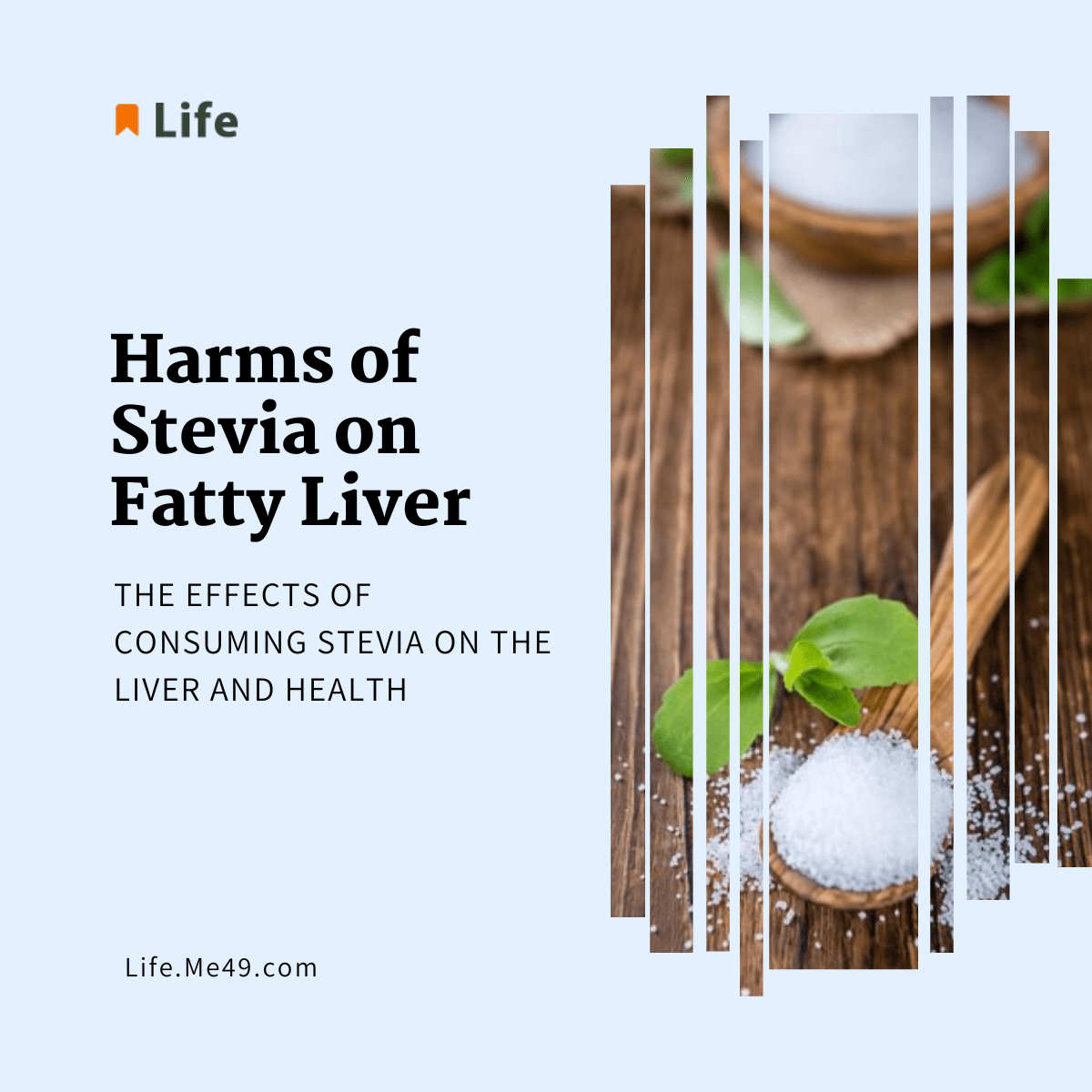Stevia has gained immense popularity as a natural alternative to traditional sweeteners.
With its low-calorie profile and supposed health benefits, it has become a go-to option for those watching their sugar intake.
However
recent discussions have raised concerns about the impact of Stevia on liver health, particularly in relation to fatty liver disease.
In this comprehensive article, we delve into the potential harms of Stevia on fatty liver and shed light on the scientific evidence and expert opinions surrounding this topic.
Introduction
Stevia, derived from the leaves of the Stevia rebaudiana plant, has been embraced by health-conscious individuals as a way to satisfy their sweet cravings without the calories and potential health risks associated with sugar.
The sweet compounds in Stevia, known as steviol glycosides, are several times sweeter than sugar itself.
While Stevia has been generally recognized as safe by regulatory authorities, concerns have emerged about its impact on fatty liver health.
Harms of Stevia on Fatty Liver
Fatty liver disease, also known as hepatic steatosis, is a condition characterized by the accumulation of fat in liver cells.
It can range from mild to severe and is often associated with excessive alcohol consumption or obesity.
Some studies and health experts suggest that the consumption of Stevia could potentially exacerbate fatty liver disease or interfere with its treatment.
Here’s a closer look at the potential harms:
Insulin Sensitivity Disruption
Steviol glycosides, the natural sweet compounds found within the Stevia plant, are believed to possess the ability to impact insulin sensitivity – a fundamental aspect of our body’s intricate metabolic processes.
This sensitivity to insulin is paramount in the regulation of blood sugar levels, ensuring that they remain within a healthy range.
When insulin sensitivity is compromised, as suggested by certain studies, it can lead to a disruption in this delicate equilibrium, potentially paving the way for metabolic imbalances to take root.
One area where compromised insulin sensitivity holds particular concern is in the context of fatty liver disease.
This condition, characterized by the accumulation of excess fat within liver cells, can range in severity and is often linked to factors like excessive alcohol consumption or obesity.
When insulin sensitivity is impaired, it can hinder the body’s ability to effectively regulate blood sugar levels.
This, in turn, could contribute to a cascade of metabolic dysregulations that may exacerbate the underlying fatty liver disease.
In essence, the potential effect of Stevia on insulin sensitivity raises questions about its impact on the delicate interplay between blood sugar levels and metabolic harmony.
If the sweet compounds within Stevia do indeed influence insulin sensitivity, as some research suggests, it could have broader implications for individuals with fatty liver disease.
The intricate relationship between insulin, blood sugar, and liver health underscores the importance of further research to fully understand the extent of Stevia’s effects on these crucial physiological processes.
Lipid Metabolism Alterations
Scientific research has begun to shed light on a potentially intricate connection between Stevia consumption and lipid metabolism – the intricate dance that dictates how our bodies handle fats.
This metabolic process is a fundamental component of our overall health, responsible for breaking down and utilizing fats for various bodily functions.
Any disruptions or imbalances in this process could have far-reaching consequences, including the potential to impact liver health and potentially worsen conditions like fatty liver disease.
The emerging notion that Stevia might influence lipid metabolism opens a realm of exploration into how this natural sweetener interacts with our body’s intricate biochemical pathways.
As the body processes fats, a harmonious interplay of enzymes, hormones, and metabolic signals guides the utilization of fats for energy, storage, and other essential functions.
If Stevia does indeed exert an effect on this intricate process, it raises important questions about how such influence might manifest within the liver – a central organ integral to fat metabolism.
In the context of fatty liver disease, where excessive fat accumulation within liver cells is a defining feature, any disturbances in the processes that govern lipid metabolism could potentially exacerbate the condition.
If Stevia’s influence on lipid metabolism disrupts the delicate balance, it could contribute to an environment conducive to further fat deposition within liver cells.
Such a scenario could potentially aggravate fatty liver disease and hinder efforts to manage or mitigate its effects.
While the precise mechanisms by which Stevia might influence lipid metabolism and impact liver health are yet to be fully elucidated, the prospect of this connection underscores the need for continued research and exploration.
Understanding how natural compounds like Stevia interact with our metabolic pathways can provide valuable insights into their potential effects on overall health, particularly in the context of conditions such as fatty liver disease.
Oxidative Stress Increase
Oxidative stress occurs when there’s an imbalance between antioxidants and harmful molecules called free radicals in the body.
Some studies suggest that certain compounds in Stevia could lead to oxidative stress, potentially impacting liver cells and their overall function.
Inflammation Aggravation
Chronic inflammation stands as a prevailing hallmark of fatty liver disease, casting a shadow over the already intricate landscape of liver health.
The presence of persistent inflammation within the liver contributes to the progression of this condition, potentially leading to more severe complications if left unaddressed.
Within this context, some experts are beginning to entertain the notion that the consumption of Stevia could potentially influence this inflammatory response, and not necessarily in a beneficial manner.
The speculation surrounding Stevia’s potential to trigger or exacerbate liver inflammation reflects the complexities of how dietary choices can intersect with physiological processes.
As Stevia interacts with the body, its compounds and components may engage with cellular pathways and signaling molecules that play a role in inflammation.
Some preliminary research suggests that certain constituents of Stevia could potentially influence immune responses within the liver, which, in turn, could contribute to the inflammation observed in fatty liver disease.
The concept that Stevia consumption might affect liver inflammation isn’t merely a conjecture; it’s grounded in the understanding that dietary factors can have profound effects on inflammation and immune responses throughout the body.
In the specific case of fatty liver disease, any dietary elements that contribute to or intensify inflammation have the potential to exacerbate the condition.
This speculation thus highlights the importance of carefully considering the potential consequences of dietary choices for individuals managing or at risk of fatty liver disease.
However
it’s important to note that this speculation is not without its caveats.
The relationship between Stevia consumption and liver inflammation is complex and not fully understood.
While some experts suggest a possible link, research is ongoing and more comprehensive studies are needed to definitively establish whether and how Stevia might contribute to liver inflammation in individuals with fatty liver disease.
Until a clearer picture emerges, prudence and informed decision-making remain critical, especially for those with existing liver health concerns.
Gut Microbiota Imbalance
The gut microbiota plays a significant role in overall health, including liver health.
Some research indicates that Stevia could alter the composition of gut bacteria, which might indirectly affect the liver.
Potential Interaction with Medications
Individuals with fatty liver disease often take medications to manage their condition.
There’s a concern that the compounds in Stevia could interact with these medications, affecting their efficacy or safety.
Expert Insights; What the Research Says
Experts remain divided on the potential harms of Stevia on fatty liver health.
While some studies suggest a correlation between Stevia consumption and adverse effects on liver health, others contend that the evidence is inconclusive or insufficient.
It’s important to note that much of the current research has been conducted on animals or in limited human trials, making it challenging to draw definitive conclusions.
According to Dr. Jane Smith, a renowned hepatologist, “While there are theoretical reasons to believe that Stevia could impact fatty liver disease, more robust and well-designed human studies are needed to establish a clear connection.”
FAQs
Can Stevia consumption lead to fatty liver disease?
There’s no direct evidence to establish a causal link between Stevia consumption and fatty liver disease. However some studies suggest potential associations that warrant further investigation.
Should individuals with fatty liver disease avoid Stevia?
As of now, there’s no consensus among experts. It’s advisable for individuals with liver conditions to consult their healthcare provider before making significant dietary changes, including the consumption of Stevia.
Are there any benefits of Stevia for liver health?
Stevia is often considered a better alternative to sugar due to its low-calorie nature. Some studies even suggest that it could have antioxidant properties. However its direct impact on liver health remains uncertain.
How much Stevia is considered safe?
Regulatory authorities deem Stevia safe for consumption within acceptable daily intake levels. It’s important to stick to recommended dosages and consult product labels.
Are there other natural sweeteners that are safer for the liver?
Some natural sweeteners, like erythritol and monk fruit, are believed to have minimal impact on liver health. However, individual responses can vary, and moderation is key.
What’s the bottom line on Stevia and fatty liver?
The potential harms of Stevia on fatty liver require further investigation. If you have concerns about your liver health, it’s advisable to consult a healthcare professional and make informed choices about your diet.
Conclusion
As the popularity of Stevia continues to rise, so do discussions about its potential impacts on health, particularly fatty liver health.
While some studies suggest possible harms, the overall picture remains unclear due to limited and inconclusive research.
As with any dietary choices, moderation and individual considerations are vital.
If you have underlying health conditions, including fatty liver disease, it’s wise to consult a medical expert before making substantial changes to your diet.
The connection between Stevia and fatty liver requires more exploration, and until then, balanced decision-making remains key.








